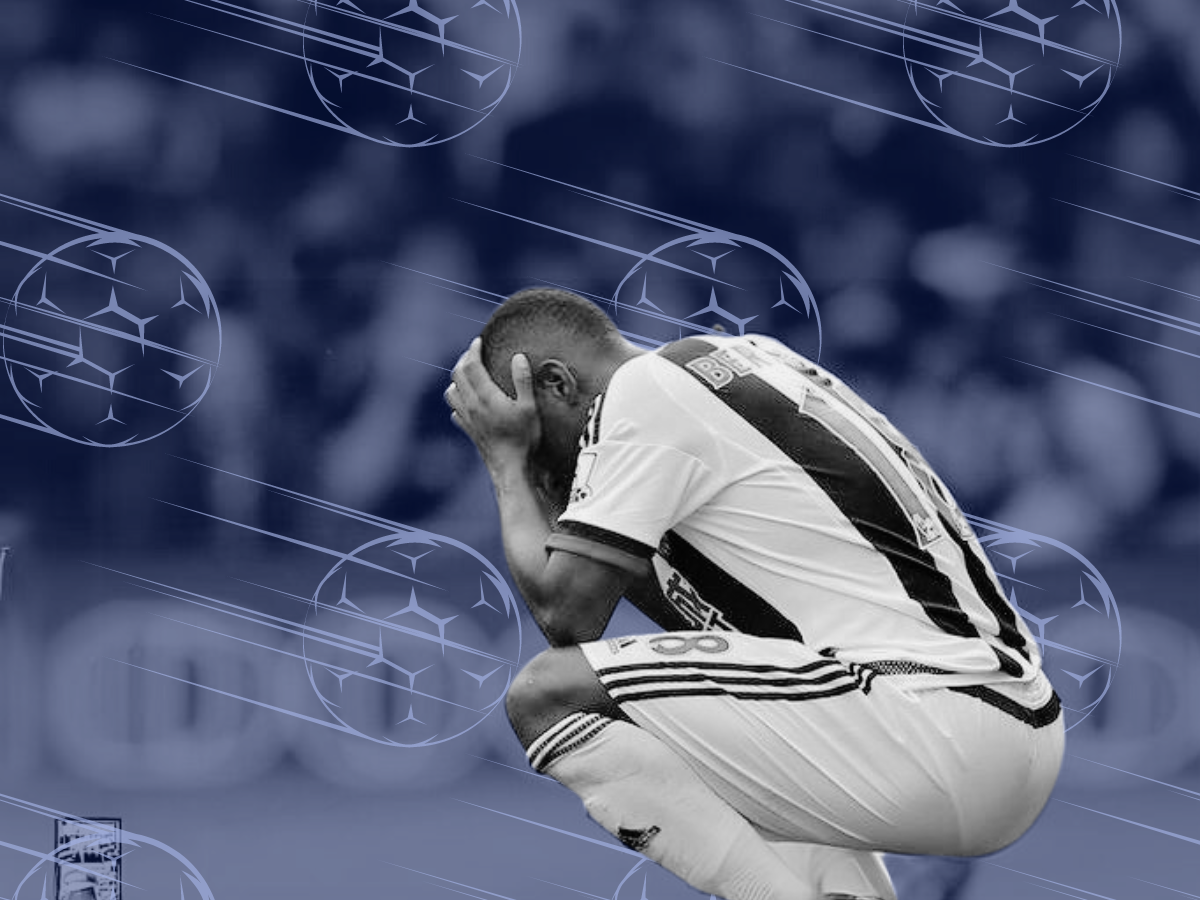In the world of football, few things are as defining and scrutinized as a striker’s ability to find the back of the net. This is why number nines are paid the big bucks at elite level.
However, behind the glamour of celebratory goals lie periods of profound challenge: goal droughts.
These stretches of barren form can be agonizing for strikers, testing their mental resilience, tactical acumen, and physical prowess.
How they can deal with setbacks and react to missing guilt-edge chances is vital, and often separates the good strikers from the world’s best.
We spoke to football psychologists to enter the minds and methodology of how they return to goal-scoring form. We will also delve deep into pressures and responsibilities strikers face, and the weight of expectations against individual player goals and reality.
From Alan Smith’s 70-game goalless streak to Saido Berahino’s failure to live up to the goal scoring hype, the Premier League has seen its fair share of strikers struggling in front of goal.
Mathew Shaw, a Sports and exercise psychologist specialising in football has worked with elite level footballers ranging from internationals who have represented their countries at World Cups, to Champions League players all the way down to the lower leagues of amateur footballers.
He said “part of it is down to the individual and their personal goal. With some players, it won’t phase them at all compared to other players, which determines how I approach talking to them.
“A lot of the time it’s caused by players dwelling on a missed opportunity within the game, which can linger with them, resulting in this negative mindset. That self-belief and arrogance that you need to play at the highest level such as the Premier League fades, and then they start over analysing their own game in their heads.
“Other times it may be strikers suffering from low confidence, and it’s our job to help them regain this motivation to get back to what they are capable of. It’s a vicious cycle.”
With football being more stat driven than it’s ever been, there’s an over-fixation towards players hitting certain numbers, scoring x amount.
Pundits are obsessed with xG and goals per minute ratios.
Whilst this can be insightful, you have to take stats with a pinch of salt due to the fact they can be interpreted differently.
Sometimes when we investigate the stats of strikers struggling for goals, it’s clear that they simply aren’t getting enough shots off or getting into the correct positions to enable them to take the shots.
It all depends on the individual player; some may be more stat driven and set their own benchmark for what metrics they want to be hitting by the end of the season, whereas others will leave the numbers on the side for fans and pundits to talk over whilst they focus on their own performance each game.
How quickly players suffer psychologically from goal droughts varies.
Dan Abrahams, a football psychologist said: “Sometimes strikers, especially those who set such high targets for themselves at the elite level, it can affect straight away when they aren’t scoring.
“Others will be aware that they are still contributing to the team despite not scoring.”
Context is extremely important for strikers to consider. For instance, if they are in a team that are struggling in the league, and they have a greater responsibility to deliver for the team, then there’s this magnifying glass over them which can make it more challenging.
At the other end of the spectrum are strikers who are part of a fluent, high-performing team where goals are coming from everywhere on the pitch, thus placing less pressure solely on the striker to score all the goals.
Just look at Man City and the free-flowing football they play under Pep Guardiola which allows for more creativity and goals from everywhere.
When strikers aren’t scoring it’s the end of the world. When they are failing to do so regularly it builds up to more pressure from fans and the media, even to the point whereby abuse is thrown at them.
The weight of delivering goals can be suffocating.
Mathew Shaw said: “Strikers face overarching feelings such as frustration and guilt, as though they should contribute more.
“The main psychological impact is that the reality of what they are doing doesn’t quite measure up to the expectations set by both themselves and others.
“There’s this lack of confidence, motivation and cloud of uncertainty surrounding their thoughts on and off the pitch”, emphasizing the intricacies of the mental battle waged within a striker’s mind.
So, how do strikers deal with this huge pressure you may ask?
Well, it’s often based around how they frame that pressure, and methods that they choose to utilise depending on their own circumstances.
Undoubtedly, strikers scoring regular goals is the primary solution to winning games, and that’s where this daunting pressure upon their shoulders builds up – particularly on some of the bigger clubs in Europe.
You only need to look at Erling Haaland.
The Norwegian powerhouse had huge shoes to fill when he joined Manchester City last season, replacing the 260 goal scorer Sergio Aguero.
He joined the City team with this exuberating confidence, borderline arrogance some might say, and he certainly stepped up to the incredibly high standard that the fourth highest Premier League goal scorer set, netting 36 goals – a record in a singular season.
Other strikers may be playing for a less free-scoring team, Dan Abrahams said: “If players are aware that they are joining a team that doesn’t create so many chances they can in turn rationalize why they aren’t scoring as much. It’s about them applying context and realising that their struggles might be more down to the rest of the team and how they tactically set up.
“I help players change their relationship with pressure, how they see it, how it makes them feel.”
Fan pressure can be both positive and negative; it can be quite motivating and energising, but also it can sap these things out.
“Most players I’ve worked with have higher expectations on themselves than what other fans put on them.
“The best dressing rooms have players who have high expectations of their teammates, and they are way more concerned with that than pressure from supporters.”
Football being the global phenomenon that it is, eyes are watching these players from all over the world; intensely analysing and heavily critiquing their performances.
We’ve seen strikers struggle to face up to the criticism of not scoring chances that they perhaps should have done, whereas others can let these emotions get the better of them and in turn creates this dark shadow over their performances, causing them to be fixated on all the background noise and less on their own individual mindset.
Mathew Shaw said: “There are fundamental things we can do to change this, sometimes it’s around how they talk to themselves off the pitch, making sure they talk to themselves in a helpful way to improve their game. Sometimes it’s about after missing chances, how do you bounce back quickly.
“It’s limiting their accessibility to analysing the chances they missed and just focusing on the next one that comes their way.”
The million-dollar question that fans and players all want to know is: What are the secrets to strikers regaining that feeling of stroking the ball into the back of the net?
The truth is that, sadly, there is no singular answer to their relentless pursuit of goals, every striker has a different mentality.
Whilst it’s not a guarantee that they will consistently find the back of the net again, they can alter the way they think about their game and how to get into better areas, which will result in an increased likelihood of them returning to the scoresheet.
Shaw helps them “visualise those chances better and allow them to feel more familiar when they are out there. If we see them not shooting, we use a soundboard approach to help them get into the box more, and potential areas where they can change their fortunes.
“One thing I emphasise a lot is when these periods happen, they can often think they have to rush to change, and panic sets in.
“The best strikers who solve their goal droughts keep to their original game, this is what they call processing goals to make sure they are thinking about two or three things maximum, often around being more aggressive and assertive.”
Taking them back to the simple strengths of their game removes any sort of doubt they may have.
Dan Abrahams said: “I challenge them to think of an alternative view, or to rationalise and put it into the context of the match. It’s making them think more critically about their performance than emotionally. Breaking it down into simple, achievable targets will lead to more shots on goal and hopefully more goals.
“Simple instructions such as decision-making, anticipation, desire or motivation are all factors to help solve a goal drought. How to be more proactive off the ball. Control the controllables.
“Less is more.”
Despite the daunting nature of goal droughts, success stories abound of strikers who have emerged from the shadows of adversity, stronger and more determined than ever. Through sheer grit, motivation and unwavering belief in their abilities, these great No.9s of our game have defied the odds to reclaim their rightful place among football’s elite goal scorers.

Dan Abrahams is a best selling author and sports
psychologist who has worked with the likes of
Gareth Bale, Eddie Howe, and Steve McClaren.

Matthew Shaw is a sports psychologist who has
worked with Team Great Britain athletes and
helped them medal at the Olympics.
Related Content




